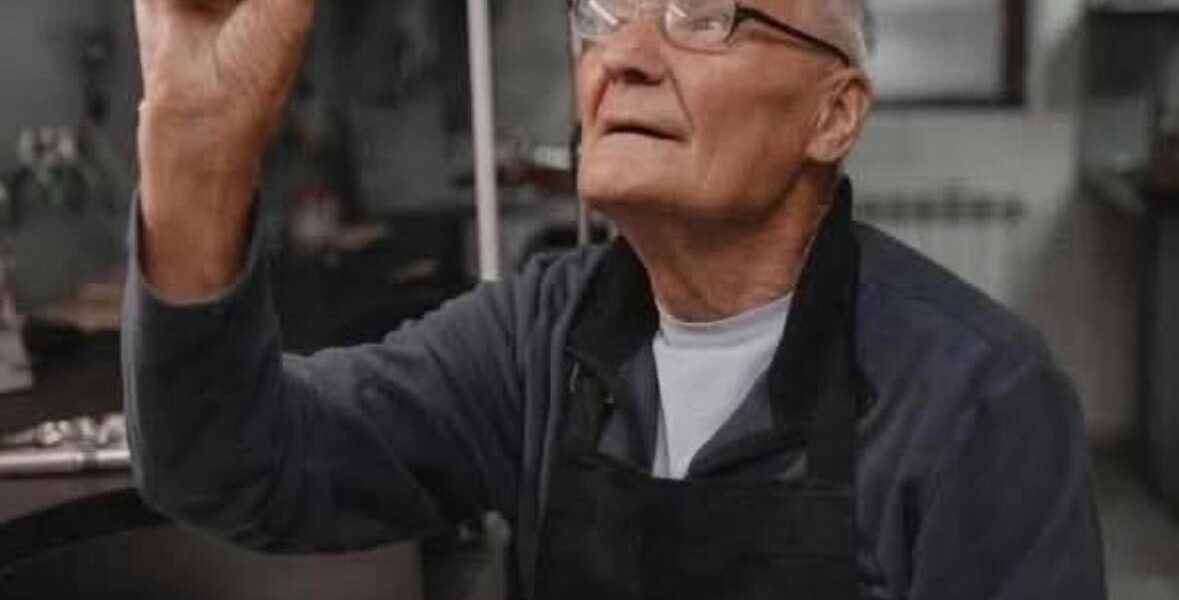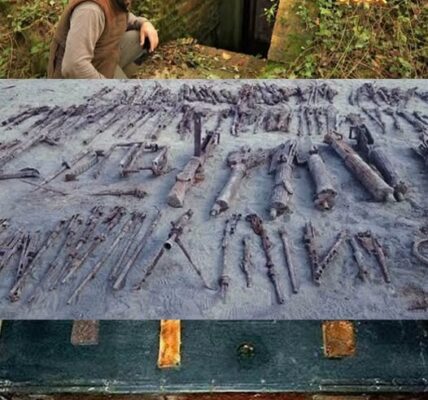“No Charge. Just Tea and Talk.” — How One Man’s Garage Sparked a Movement of Repair and Kindness.

When 79-year-old George retired, he didn’t book a cruise or invest in golf clubs. He didn’t buy a hammock or chase the sun to Florida. Instead, he hung a handmade cardboard sign in the dusty window of his garage in Maple Grove:
“Broken things? Bring ’em here. No charge. Just tea and talk.”
The neighbors thought he’d gone soft in the head.
“Who fixes things for free?” muttered the town barber.
In Maple Grove—a once-busy mill town now grayed and frayed around the edges—generosity wasn’t exactly in vogue. But George had his reasons. His wife, Ruth, had spent decades mending what others discarded. Torn coats, shattered picture frames, broken hearts—she patched them all with gentle hands and a sharp eye. Her favorite saying: “Waste is a habit. Kindness is the cure.” When Ruth passed the year before, George’s hands itched—not with grief, but with purpose.
Then came Mia.
Eight years old, clutching a busted plastic toy truck and dragging her feet.
“Dad says we can’t afford a new one,” she whispered, eyes downcast.
George offered her tea in a chipped mug and got to work. He rummaged through his chaotic toolbox, humming tunelessly, until—click. The truck rolled again. A bottle cap wheel. A strip of duct tape. George smiled.
“Now it’s custom.”
Mia smiled back. But before she left, her mother lingered.
“Can you fix a résumé?” she asked quietly. “I haven’t worked since the factory shut down.”
George couldn’t type, but he knew someone who could. And by noon, the garage was humming. A retired teacher proofread the résumé. A former seamstress stitched Mia’s torn backpack. George patched a widow’s clock. Volunteers poured in—people who missed being useful, who missed being needed.
They brought not just broken things, but broken moments, broken confidence, broken routines.
And George fixed them all. One conversation at a time.
Until the inspector came.
“Unlicensed business,” he barked. “Violation of zoning law.”
The mayor, clipboard in hand and compassion nowhere in sight, ordered George to shut down.
But Maple Grove wasn’t having it.
The next morning, 40 townsfolk stood shoulder to shoulder on George’s front lawn—holding broken toasters, snapped broom handles, torn quilts, and hand-painted signs:
“Fix the law, not just stuff.”
“Kindness is not a crime.”
“Tea and Talk is All We Need.”
A local reporter caught the moment. Her segment went viral:
“Is kindness illegal?”
The mayor caved. Well, sort of.
“If you want to fix things,” he grumbled, “do it downtown. Rent the old firehouse. But no guarantees.”
The community jumped in. Volunteers gutted the firehouse, painted it sunshine yellow, and christened it “Ruth’s Hub.”
No one was paid. No one asked for fees.
But everyone gave something.
A retired plumber taught teens to fix leaky pipes. A baker swapped muffins for a repaired microwave. Elders passed down the art of darning socks. Unemployed parents built confidence while patching bikes. The town’s waste dropped by 30%, but the real transformation was invisible.
Conversations bloomed.
A lonely widower and a single father fixed a lamp together and cried quietly about loss. Teens sat beside veterans, repairing radios and learning about the wars they’d never read about in school. The Hub didn’t just restore broken objects—it restored dignity.
Then last week, George found a letter in his mailbox.
It was from Mia.
She’s 16 now. Interning at a robotics lab.
“You taught me to see value in broken things,” she wrote.
“I’m working on a solar-powered prosthetic arm.
PS: The truck still runs.”
Today, there are 12 Fix-It Hubs across the state. None charge money. All serve tea.
All started with an old man, a battered garage, and a belief:
The world isn’t broken. It’s just waiting to be mended.

